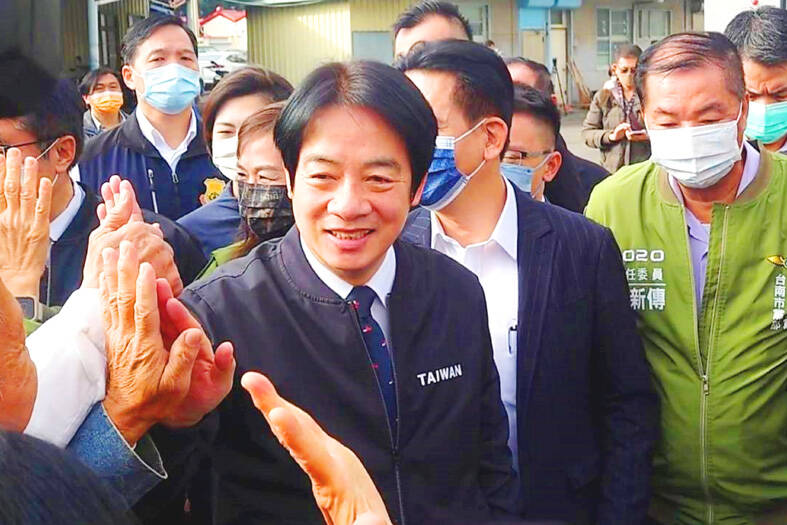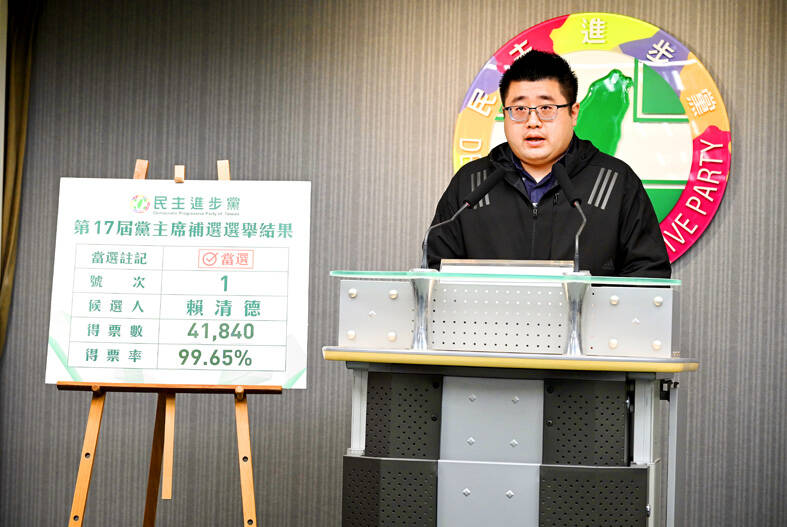Vice President William Lai (賴清德) yesterday pledged to unite the Democratic Progressive Party (DPP) and to “polish its image as an honest, diligent and grassroots party,” after he was elected its new chairman.
The election was held after President Tsai Ing-wen (蔡英文) stepped down as DPP chairperson following the party’s bruising defeats in the local elections on Nov. 26 last year.
Lai, who ran unopposed, was elected with 99.65 percent of the votes, DPP interim secretary-general Sidney Lin (林鶴明) told a news conference last night.

Photo: CNA
Lai won 41,840 votes and the turnout rate was 17.59 percent, slightly higher than the 16.9 percent in the previous chairperson election in 2019, Lin said.
The DPP’s Central Standing Committee is to confirm the result on Wednesday, after which Lai is to take over the post from Kaohsiung Mayor Chen Chi-mai (陳其邁), who was appointed by the committee as the party’s interim chairman.
Lai’s term as DPP chairman is to end on May 19 next year.

Photo: Lo Pei-de, Taipei Times
After Lin’s announcement, Lai said in a statement that he would “go all-in to undertake the mission” entrusted to him.
His goals are to win back people’s trust, unite the party and lead the DPP to honor its slogan — “honesty, diligence and love for the country,” he said.
The DPP brought about a democratic revolution in Taiwan, Lai said, adding that its mission is to safeguard the nation and promote democracy, peace and prosperity.
He thanked those party members who cast their ballots, adding that every vote and all of their advice would contribute to the “drive for the DPP to revive.”
Chen thanked Lai for shouldering the challenges the DPP is facing and said he hopes the party can regroup soon to guard the country.
Chinese Nationalist Party (KMT) Cultural and Communications Committee director Hung Meng-kai (洪孟楷) congratulated Lai and said he hopes the KMT and DPP can have a healthy competition and value the public’s opinions.
Lai is widely expected to run for president next year, but the 63-year-old chairman-elect first has to take on some major challenges facing the party.
These include bringing the DPP back on track after local election defeats, restoring unity in an increasingly divided party and trying to win back the support of younger voters.
Ahead of the chairperson election, Lai held his final political platform presentation on Saturday night in Tainan.
Party members who spoke at the event expressed their hopes that Lai would crack down on allegedly illicit finances and organized crime connections within the DPP, saying the issues are causing great damage to the party.
Those who act against party discipline should be punished without mercy, they said, referring to allegations of vote-buying in the Tainan City Council speaker election last month.
In response, Lai led DPP Tainan Mayor Huang Wei-che (黃偉哲), as well as Tainan city councilors and six DPP legislators representing constituencies in the city, in a bow to apologize to party members.
Party members told him they had not given up on the DPP, Lai said, adding that democracy is the goal that the party pursues.
He asked party members holding government positions not to forget the aspirations they had when first joining the party, adding that they should not put personal interests ahead of the interests of the country.
Additional reporting by Wang Shu-hsiu, Hung Jui-chin, Lin Liang-sheng and CNA

The CIA has a message for Chinese government officials worried about their place in Chinese President Xi Jinping’s (習近平) government: Come work with us. The agency released two Mandarin-language videos on social media on Thursday inviting disgruntled officials to contact the CIA. The recruitment videos posted on YouTube and X racked up more than 5 million views combined in their first day. The outreach comes as CIA Director John Ratcliffe has vowed to boost the agency’s use of intelligence from human sources and its focus on China, which has recently targeted US officials with its own espionage operations. The videos are “aimed at

STEADFAST FRIEND: The bills encourage increased Taiwan-US engagement and address China’s distortion of UN Resolution 2758 to isolate Taiwan internationally The Presidential Office yesterday thanked the US House of Representatives for unanimously passing two Taiwan-related bills highlighting its solid support for Taiwan’s democracy and global participation, and for deepening bilateral relations. One of the bills, the Taiwan Assurance Implementation Act, requires the US Department of State to periodically review its guidelines for engagement with Taiwan, and report to the US Congress on the guidelines and plans to lift self-imposed limitations on US-Taiwan engagement. The other bill is the Taiwan International Solidarity Act, which clarifies that UN Resolution 2758 does not address the issue of the representation of Taiwan or its people in

US Indo-Pacific Commander Admiral Samuel Paparo on Friday expressed concern over the rate at which China is diversifying its military exercises, the Financial Times (FT) reported on Saturday. “The rates of change on the depth and breadth of their exercises is the one non-linear effect that I’ve seen in the last year that wakes me up at night or keeps me up at night,” Paparo was quoted by FT as saying while attending the annual Sedona Forum at the McCain Institute in Arizona. Paparo also expressed concern over the speed with which China was expanding its military. While the US

SHIFT: Taiwan’s better-than-expected first-quarter GDP and signs of weakness in the US have driven global capital back to emerging markets, the central bank head said The central bank yesterday blamed market speculation for the steep rise in the local currency, and urged exporters and financial institutions to stay calm and stop panic sell-offs to avoid hurting their own profitability. The nation’s top monetary policymaker said that it would step in, if necessary, to maintain order and stability in the foreign exchange market. The remarks came as the NT dollar yesterday closed up NT$0.919 to NT$30.145 against the US dollar in Taipei trading, after rising as high as NT$29.59 in intraday trading. The local currency has surged 5.85 percent against the greenback over the past two sessions, central